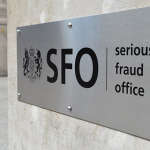In a verdict that gives the Ministry of Justice at least a temporary reprieve in its legal aid battle with the Bar, the Court of Appeal today (21 May) reversed the Crown Court’s ruling that the ‘OpCotton’ serious fraud trial should be stayed after the defendants failed to find any barrister prepared to represent them on reduced legal aid rates.
Handing down the Court of Appeal’s decision, Lord Justice Leveson said today that His Honour Judge Leonard QC, sitting in Southwark Crown Court on 1 May, was wrong to halt the trial rather than to adjourn it, and wrong to find that there was no realistic prospect of advocates being available in the foreseeable future.
Leveson said: ‘At the date of the hearing before the judge, on our analysis, there was a sufficient prospect of a sufficient number of PDS [Public Defender Service] advocates who were then available who would enable a trial to proceed in January 2015. That pool included a sufficient number of advocates of the rank of QC and was available at the date of the hearing.
‘It had been made plain by the PDS that its available advocates would be assigned on a “first come first served” basis, so that prompt action on the part of the defence was necessary to secure their services.
‘In those circumstances, the finding of the judge that there was no realistic prospect of competent advocates with sufficient time to prepare being available in the foreseeable future cannot be sustained; neither was it reasonable for him to reach it.’
The trial, which was brought by the Financial Conduct Authority after its Operation Cotton investigation, was declared on 22 July last year to be a ‘very high cost case’ (VHCC) by the Legal Aid Authority, a category of cases that, after the Ministry of Justice announced public funding cuts of 30% on September 2013, advocates with a contract to conduct VHCC work chose to end the contract on the new rates.
Mr Justice Leonard concluded earlier this month that ‘to allow the State an adjournment to put right its failure to provide the necessary resources to permit a fair trial to take place now would amount to a violation of the process of this court.’
However, Leveson concluded that Leonard was wrong both to find fault and violation of the process of the court, commenting: ‘Given that the judge had made clear (at para. 25) that his decision had to be taken “without regard to the continuing dispute between the Bar and the Ministry of Justice” and that he was “only concerned … to ensure that a trial is only held if it can be conducted fairly in accordance with the principles long established in this country”, it is surprising that he made any decision attributing fault.’
The Court of Appeal further ruled that while it is the responsibility of the Lord Chancellor to provide the resources to permit a fair trial, problems in doing so do not equate to a violation of the process of the court or jeopardise the integrity of the criminal justice system.
However, this does not provide the MoJ with a get-out clause in all further serious fraud cases, should legal representation be found to be unavailable.
Leveson said: ‘We are not saying that there could not come a time when it may be appropriate to order that this indictment be stayed: that time, however, remains very much in the future and problems about representation will have to have developed considerably before such an exceptional order could be justified. It would be a matter for the judge to assess on the basis of how matters stand at that point in time.’
And while the Court of Appeal made it clear that it was not its place to become involved in the dispute between the MoJ and the Bar, Leveson concluded: ‘We cannot leave this case, however, without making some further comment. During the course of the hearing, we made it clear that the dispute between the Bar and the Lord Chancellor about the appropriate level of remuneration for VHCCs was not one in which we could (or should) become involved. It involves a commercial negotiation in which (short of legal challenge) the judiciary can play no part. In any event, it is not before the court and we have received neither evidence nor submissions from any of the protagonists. That is not to say, however, that we are unmindful of or unconcerned about the issues and the underlying impact of the dispute.
‘The criminal justice system in this country requires the highest quality advocates both to prosecute and to defend those accused of crime: in addition, they are the potential judges of the future. The better the advocates, the easier it is to concentrate on the real issues in the case, the more expeditious the hearing and the better the prospect of true verdicts according to the evidence. Poor quality advocates fail to take points of potential significance, or take them badly, leading to confusion and, in turn, appeals and, even more serious, leading to potential miscarriages of justice. We have no doubt that it is critical that there remains a thriving cadre of advocates capable of undertaking all types of publicly funded work, developing their skills from the straightforward work until they are able to undertake the most complex.
‘In those circumstances, it is of fundamental importance that the MoJ led by the Lord Chancellor and the professions continue to try to resolve the impasse that presently stands in the way of the delivery of justice in the most complex of cases: this will require effort by both sides. The maintenance of a criminal justice system of which we can be proud depends on a sensible resolution of the issues that have arisen.’
Grayling was represented at the Court of Appeal stage by Blackstone Chambers’ joint head Anthony Peto QC and Peter Woodall from legal aid agency the Public Defender Service, which he joined from Carmelite Chambers last month.
The FCA was represented by Sean Larkin QC from QEB Hollis Whiteman Chambers, with Blackstone’s Ben Jaffey acting as his junior.
Representing the defendants, pro bono, was the Prime Minister David Cameron’s brother Alex Cameron QC.
The case, which charges Scot Crawley, Dale Walker, Daniel Forsyth, Aaron Petrou and Brendon Daley with conspiracy to defraud, possessing criminal property and offences relating to the activities of Plott UK, European Property Investments and Stirling Alexander, will now return to Southwark Crown Court.
caroline.hill@legalease.co.uk











